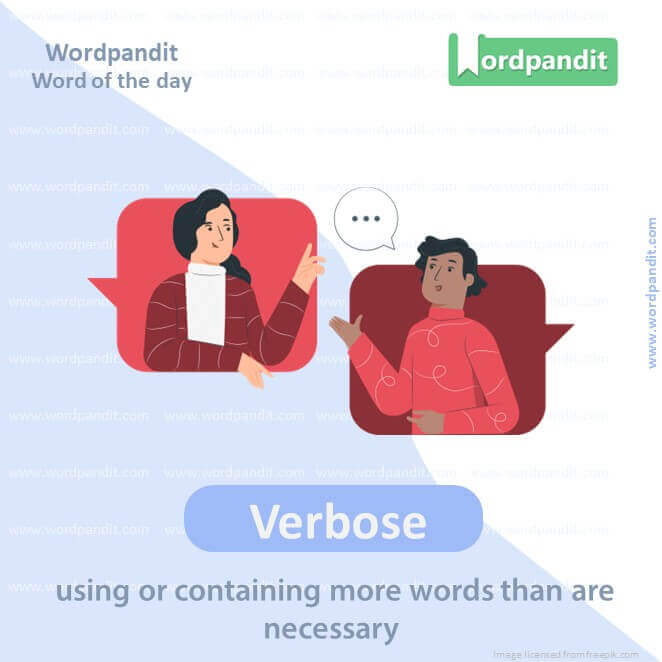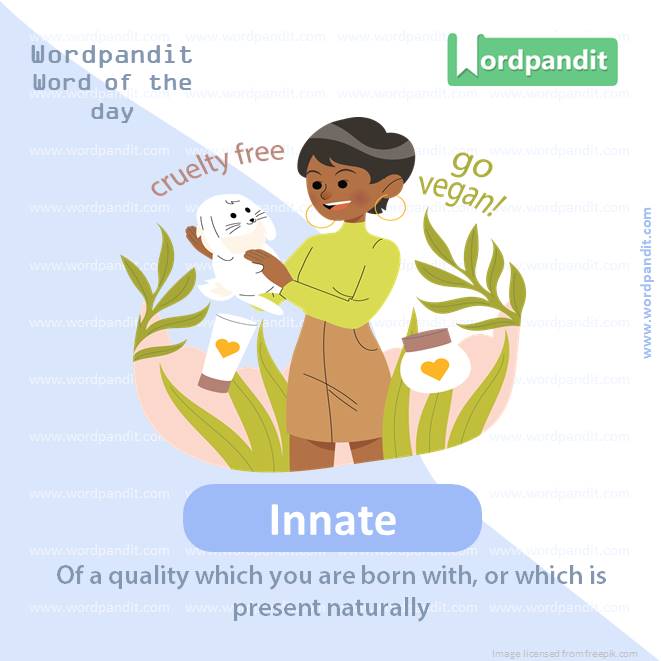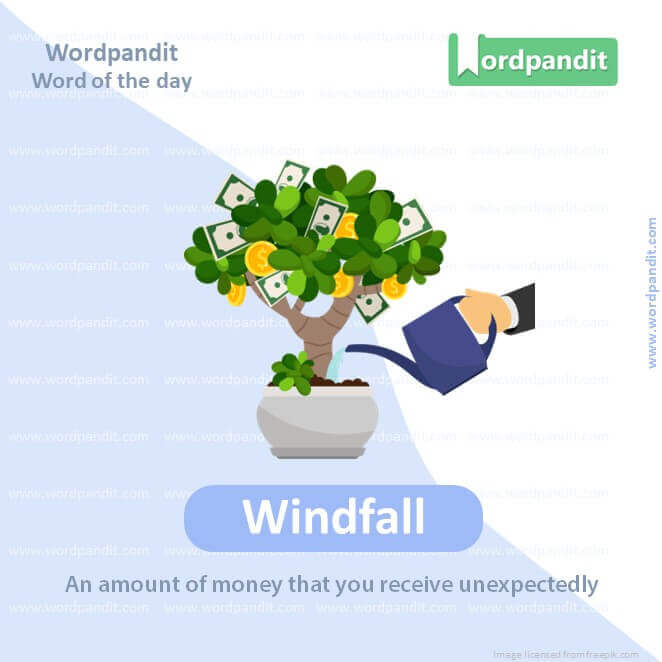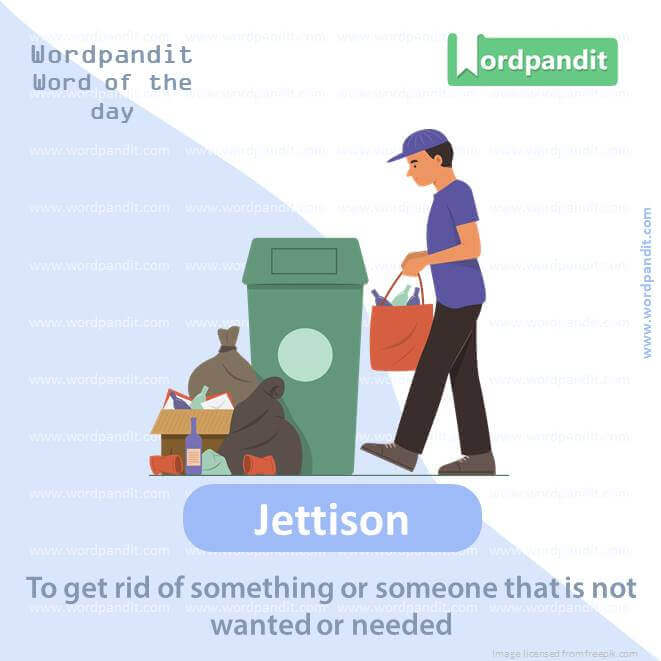Daily Vocabulary Words: List of Daily Used Words in Leading Indian Newspapers
Hi there. Welcome to this special section @ Wordpandit. Our endeavour here is straightforward: highlighting daily vocabulary words that you would come across in leading newspapers in the country. We have included the following newspapers in our selection:
• The Times of India
• The Economic Times
• Hindustan Times
• Mint
• Indian Express
We are putting in extensive work to develop your vocabulary. All you have to do is be regular with this section and check out this post daily. This is your repository of commonly used words; essentially, we are posting a list of daily used words. Hence, this has significant practical application as it teaches you words that are commonly used in leading publications mentioned above.
Visit the website daily to learn words from leading Indian newspapers.

WORD-1: VERBOSE
CONTEXT: Critics claim that the author’s latest book is verbose, spending unnecessary pages on minor details rather than focusing on the core plot.
SOURCE: The Times of India
EXPLANATORY PARAGRAPH: Imagine you have a toy box and instead of putting just one toy inside, you stuff it with too many toys till it’s overflowing. The word “verbose” is like that toy box but for talking or writing. It means someone is using way too many words than they need to explain something. It’s like saying “Hi, how are you today on this sunny, bright, and cheerful morning?” instead of just “Hi, how are you?”
MEANING: Using or containing more words than are necessary (adjective).
PRONUNCIATION: ver-BOHS
SYNONYMS: Wordy, long-winded, prolix, loquacious, redundant, rambling, expansive.
USAGE EXAMPLES:
1. Her speech was verbose and it took hours to finish.
2. Teachers sometimes ask students to avoid being verbose in their essays.
3. I realized my explanation was too verbose when I saw him yawning.
4. He has a verbose style of writing, often taking pages to make a point.
WORD-2: NAIL-BITTER
CONTEXT: Last night’s cricket match turned into a real nail-biter, with the result being decided on the last ball.
SOURCE: Hindustan Times
EXPLANATORY PARAGRAPH: Have you ever watched a cartoon where you’re so nervous or excited about what’s going to happen next that you chew on your nails without realizing? That feeling or anything that makes you feel that way can be called a “nail-biter.”
MEANING: A situation or event that is very tense or exciting (noun).
PRONUNCIATION: NAYL-BY-tur
SYNONYMS: Cliffhanger, suspenseful, thriller, edge-of-the-seat, tense, gripping, exciting.
USAGE EXAMPLES:
1. The final moments of the game were a real nail-biter.
2. Everyone was on edge during the nail-biter of a movie.
3. The election results turned out to be a nail-biter.
4. Will she make it in time? It’s a nail-biter!

WORD-3: INNATE
CONTEXT: Scientists argue that while education and environment play a role, an innate talent is often evident in child prodigies from a very young age.
SOURCE: The Economic Times
EXPLANATORY PARAGRAPH: You know how some baby birds just know how to fly without being taught? Or how you might naturally be good at drawing or singing without taking lessons? That’s because it’s “innate.” It means you’re born with it or it’s natural for you.
MEANING: Of a quality which you are born with, or which is present naturally (adjective).
PRONUNCIATION: in-NAYT
SYNONYMS: Inborn, natural, intrinsic, inherent, instinctive, congenital.
USAGE EXAMPLES:
1. His talent for music is innate; he never had a lesson.
2. Birds have an innate sense of direction during migration.
3. Her innate kindness is one of her most admirable qualities.
4. It seems like an innate ability; she’s been drawing since she could hold a pencil.

WORD-4: WINDFALL
CONTEXT: The sudden surge in the stock market brought a windfall for many investors who had kept faith during the downturn.
SOURCE: Mint
EXPLANATORY PARAGRAPH: Imagine a big apple tree. One day, a strong wind blows and a bunch of apples fall down. You didn’t expect these apples, but now you have more than you thought! That’s what we call a “windfall.” It means getting something good unexpectedly, like surprise money or gifts.
MEANING: An amount of money that you receive unexpectedly (noun).
PRONUNCIATION: WIND-fawl
SYNONYMS: Bonanza, jackpot, boon, gain, blessing, gift, fortune.
USAGE EXAMPLES:
1. The lottery win was a huge windfall for the family.
2. She received a windfall inheritance from a distant relative.
3. The investors were thrilled with the windfall profits this quarter.
4. The unexpected donation to the school was a real windfall.
WORD-5: VANDALIZED
CONTEXT: The ancient monument was vandalized last night, with local authorities now searching for the culprits responsible for defacing the historical site.
SOURCE: Indian Express
EXPLANATORY PARAGRAPH: Imagine if someone took your favorite toy and drew all over it with markers without your permission. That’s similar to “vandalized.” It means someone damaged or destroyed something that wasn’t theirs, usually on purpose.
MEANING: Deliberately damaged or destroyed (usually referring to property or objects) (verb).
PRONUNCIATION: VAN-duh-lyzed
SYNONYMS: Defaced, damaged, wrecked, ruined, marred, desecrated.
USAGE EXAMPLES:
1. The park bench was vandalized with graffiti.
2. Someone vandalized the school’s statue last night.
3. They were upset to find their car windows vandalized.
4. We need to find out who vandalized the community center.

WORD-6: HOODWINK
CONTEXT: Consumer protection agencies warn individuals to be cautious of online schemes that attempt to hoodwink them out of their savings.
SOURCE: The Times of India
EXPLANATORY PARAGRAPH: Imagine if someone showed you a magic trick and made you believe something happened when it didn’t. That’s a little like being “hoodwinked.” It means someone tricked or fooled you.
MEANING: To deceive by false appearance: dupe / someone means to trick or mislead them (verb).
PRONUNCIATION: HOOD-wink
SYNONYMS: Deceive, trick, fool, dupe, bamboozle, mislead, beguile.
USAGE EXAMPLES:
1. She managed to hoodwink him into signing the contract.
2. I can’t believe I let myself be hoodwinked by that scam.
3. The magician hoodwinked the audience with his amazing tricks.
4. They tried to hoodwink the customers with false advertising.

WORD-7: JETTISON
CONTEXT: Faced with mounting debts, the company decided to jettison its least profitable division in hopes of balancing the books.
SOURCE: The Economic Times
EXPLANATORY PARAGRAPH: Imagine you’re in a hot air balloon and it’s not rising because it’s too heavy. So, you throw out some sandbags to make it lighter and go up. That action of throwing things away to help you in a situation is called “jettison.”
MEANING: To get rid of something or someone that is not wanted or needed (verb).
PRONUNCIATION: JET-ih-son
SYNONYMS: Discard, dump, throw out, get rid of, shed, cast off, abandon.
USAGE EXAMPLES:
1. To gain altitude, the pilot had to jettison some cargo.
2. They had to jettison unnecessary baggage during the storm.
3. The company decided to jettison its unprofitable products.
4. After the engine failure, they had to jettison fuel.
WORD-8: VERITABLE
CONTEXT: The museum’s new exhibition offers a veritable treasure trove of artifacts from the pre-historic era, attracting history enthusiasts from all over the country.
SOURCE: Hindustan Times
EXPLANATORY PARAGRAPH: You know when you want to say something is really, really true or real? Like, if you see a huge ice cream cone, and you say, “That’s a real, true, big ice cream!” The word “veritable” is a fancy way to say just that.
MEANING: Being truly or very much so (adjective).
PRONUNCIATION: VEH-ri-tuh-bul
SYNONYMS: Genuine, real, true, authentic, bona fide, unquestionable.
USAGE EXAMPLES:
1. The city was a veritable playground for adventurers.
2. He’s a veritable genius in mathematics.
3. The festival was a veritable feast for the senses.
4. With all her toys, her room is a veritable toy store.
WORD-9: LAMBAST
CONTEXT: The opposition parties took the opportunity to lambast the government’s recent policy decisions, claiming they were not in the best interest of the public.
SOURCE: Indian Express
EXPLANATORY PARAGRAPH: Think about someone scolding or telling off a naughty pet very strictly. The word “lambast” is like that, but for people. It means to criticize or scold someone very harshly.
MEANING: To criticize or reprimand severely (verb).
PRONUNCIATION: lam-BAST
SYNONYMS: Scold, berate, reprimand, rebuke, chastise, upbraid, castigate.
USAGE EXAMPLES:
1. The coach lambasted the team for their poor performance.
2. The movie was lambasted by critics for its weak storyline.
3. He was lambasted in the media for his controversial comments.
4. Parents shouldn’t lambast children for making small mistakes.
WORD-10: DISSUADE
CONTEXT: Environmental activists are trying to dissuade the public from using single-use plastics by highlighting their harmful impact on marine life.
SOURCE: Live Mint
EXPLANATORY PARAGRAPH: Have you ever wanted to do something, like maybe touch a hot stove, and someone tells you all the reasons why you shouldn’t? That person is trying to “dissuade” you. It means they’re trying to convince you not to do something.
MEANING: To persuade someone not to take a particular action or course (verb).
PRONUNCIATION: dih-SWAYD
SYNONYMS: Discourage, deter, prevent, advise against, caution, hinder.
USAGE EXAMPLES:
1. I tried to dissuade him from taking that risky job offer.
2. Her parents tried to dissuade her from dropping out of school.
3. The heavy rain did nothing to dissuade the enthusiastic fans.
4. She was dissuaded from climbing the tree after her friend’s fall.













